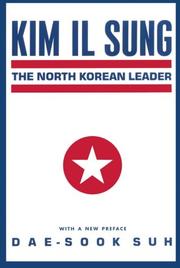| Listing 1 - 3 of 3 |
Sort by
|

ISBN: 0231065728 0231065736 Year: 1988 Publisher: New York Columbia university press
Abstract | Keywords | Export | Availability | Bookmark
 Loading...
Loading...Choose an application
- Reference Manager
- EndNote
- RefWorks (Direct export to RefWorks)
Heads of state --- Biography --- Kim, Il-sŏng, --- Korea (North) --- Politics and government. --- -K9500.90 --- K9190 --- K9125.90 --- Heads of government --- Rulers --- State, Heads of --- Executive power --- Statesmen --- Korea: Politics -- history -- North Korea (1945- ) --- Korea: History -- North Korea (1945- ) --- Korea: Genealogy and biography -- biography -- North Korea (1945- ) --- Kim, Il-song --- Kim Ir Sen --- Kim Il Sung --- Kim, Il-Sǒng --- -Politics and government --- Kim, Il Sung. --- Kim, Il Sung --- 김, 일성 --- 金, 日成 --- -Biography
Book
ISBN: 9781503613294 1503613291 9781503627635 1503627632 1503627640 9781503627642 Year: 2021 Publisher: Stanford, California
Abstract | Keywords | Export | Availability | Bookmark
 Loading...
Loading...Choose an application
- Reference Manager
- EndNote
- RefWorks (Direct export to RefWorks)
Far from always having been an isolated nation and a pariah state in the international community, North Korea exercised significant influence among Third World nations during the Cold War era. With one foot in the socialist Second World and the other in the anticolonial Third World, North Korea occupied a unique position as both a postcolonial nation and a Soviet client state, and sent advisors to assist African liberation movements, trained anti-imperialist guerilla fighters, and completed building projects in developing countries. State-run media coverage of events in the Third World shaped the worldview of many North Koreans and helped them imagine a unified anti-imperialist front that stretched from the boulevards of Pyongyang to the streets of the Gaza Strip and the beaches of Cuba. This book tells the story of North Korea's transformation in the Third World from model developmental state to reckless terrorist nation, and how Pyongyang's actions, both in the Third World and on the Korean peninsula, ultimately backfired against the Kim family regime's foreign policy goals. Based on multinational and multi-archival research, this book examines the intersection of North Korea's domestic and foreign policies and the ways in which North Korea's developmental model appealed to the decolonizing world.
Korea (North) --- Developing countries --- Foreign relations --- Authoritarianism. --- Bandung. --- Cold War. --- Communism. --- Decolonization. --- Global South. --- Juche. --- Kim Il Sung. --- North Korea. --- Socialism. --- Third World.
Book
ISBN: 1316235866 1316233979 1139021699 0521897785 0521723442 Year: 2015 Publisher: Cambridge : Cambridge University Press,
Abstract | Keywords | Export | Availability | Bookmark
 Loading...
Loading...Choose an application
- Reference Manager
- EndNote
- RefWorks (Direct export to RefWorks)
In this historically grounded, richly empirical study of social and economic transformation in North Korea, Hazel Smith evaluates the 'marketization from below' that followed the devastating famine of the early 1990s, estimated to be the cause of nearly one million fatalities. Smith shows how the end of the Cold War in Europe and the famine brought radical social change to all of North Korean society. This major new study analyses how marketization transformed the interests, expectations and values of the entire society, including Party members, the military, women and men, the young and the elderly. Smith shows how the daily life of North Koreans has become alienated from the daily pronouncements of the North Korean government. Challenging stereotypes of twenty-five million North Koreans as mere bystanders in history, Smith argues that North Koreans are 'neither victims nor villains' but active agents of their own destiny.
Kim, Il-sŏng, --- Kim, Chŏng-il, --- Kim, Chŏng-ŭn, --- 김 정은, --- Kim, Jong-un, --- Kim, Jong-eun, --- Kimu, Jon'un, --- 金 正恩, --- 金正恩, --- Kim, Jong Il, --- Kin, Shōnichi, --- Chin, Cheng-jih, --- Kim, Djeund Il, --- Il, Kim Djeung, --- Ir, Kim Chen, --- Kim, Chen Ir, --- 金正日, --- 金 正日, --- 김 정일, --- 김정일, --- Kaṅʻmʻ, Gyuṃʼī, --- Kin, Nissei, --- Ким, Ир-сен, --- Kim, Ir-sen, --- Sung, Kim Il, --- Kim, Il Sung, --- Chin, Jih-chʻeng, --- Jin, Richeng, --- Sūngh, Kīm Īl, --- Kīm, Īl Sūngh, --- Kimu, Iruson, --- Kim, Jl-sung, --- Kim, Sŏng-ju, --- كيم، ايل سونج --- 金 日成, --- 金日成, --- 김 일성, --- 김일성, --- Korea (North) --- Politics and government. --- Economic conditions. --- Social conditions. --- Kim, Jong Il --- Kim Jong Il --- Kim, Djeung Il --- Kim Djeung Il --- Kim, Chŏng-il --- Gim, Jeong-il --- 김, 정일 --- 金, 正日
| Listing 1 - 3 of 3 |
Sort by
|

 Search
Search Feedback
Feedback About UniCat
About UniCat  Help
Help News
News